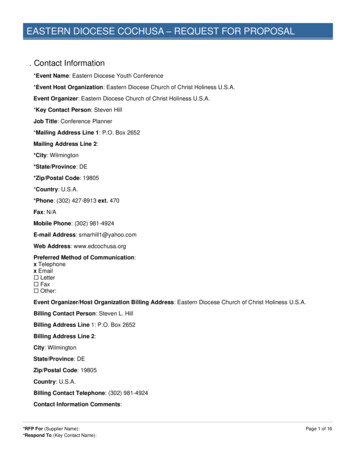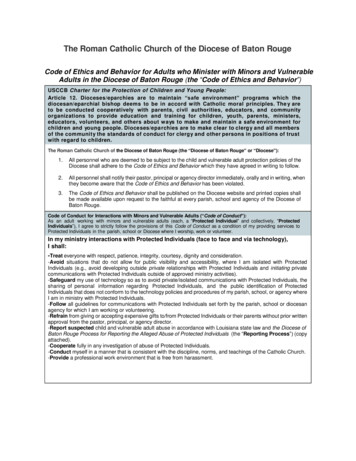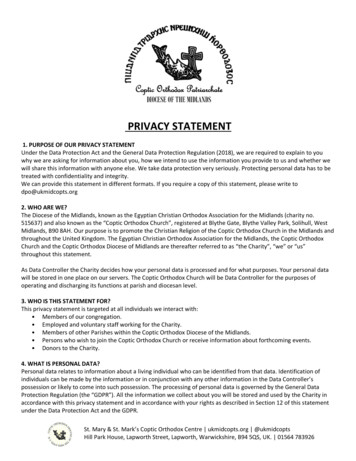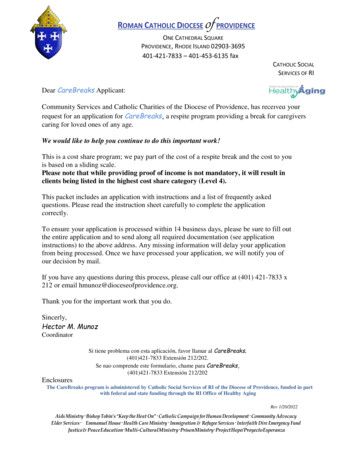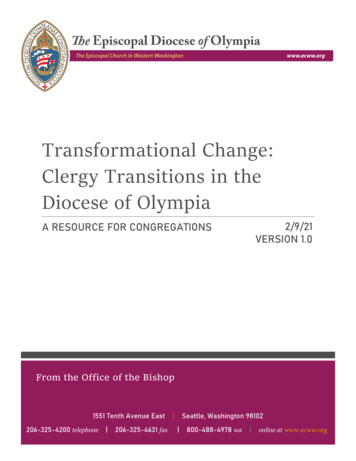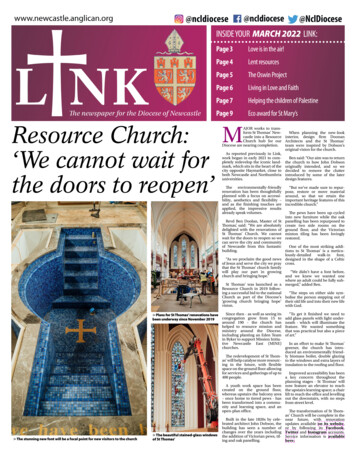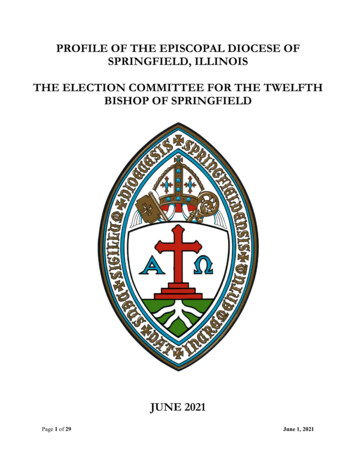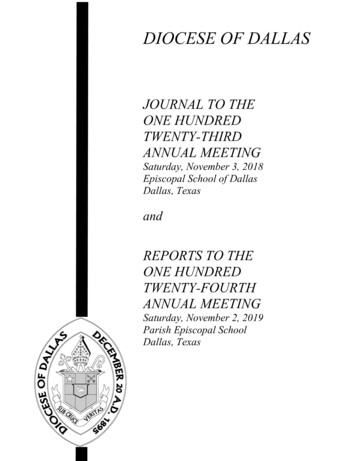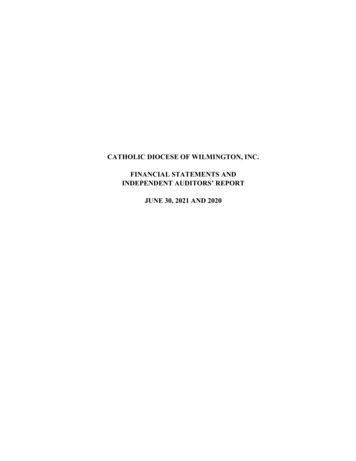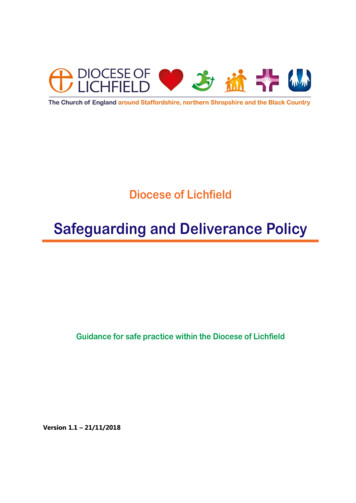
Transcription
Diocese of LichfieldSafeguarding and Deliverance PolicyGuidance for safe practice within the Diocese of LichfieldVersion 1.1 – 21/11/20181
Written By; Peter Mockford (Deliverance Ministry lead) Diocese of Lichfield Board of Finance2018Contents1.Updated guidelines for good practice in the Deliverance Ministry Lichfield Diocese2018. . 32.Prayer (and sacrament) . 33.Safety and safeguarding . 44.Authorisation and diocesan regulation . 45.Exorcism . 46.The work of Advisors . 47.Training and supervision . 48.Competence and boundaries . 59.Personal conduct. 510.Confidentiality, record keeping and public statements . 511.Counselling and psychotherapy. 512.Continuing pastoral care . 613.Collaboration with the resources of healthcare . 62
1.Updated guidelines for good practice in theDeliverance Ministry Lichfield Diocese 2018.The House of Bishops Deliverance Ministry Guidelines were originally set out by the house ofBishops in 1975, and updated in 2012. These are the official guidelines for the Church ofEngland. These guidelines for Lichfield diocese are based on the above, and take into accountthe developments in safeguarding and GDPR.It is traditional for Christians to pray for deliverance from evil; the petition in the Lord’s Prayeris an obvious and foundational example of this. Praying with people for their needs andprotection is often an appropriate pastoral way of ministering to them. There are however,some situations where a person is distressed and or claims to be afflicted by an evil power orspirit. Particular caution needs to be exercised, especially when ministering to someone who isin a distressed state(1).In this sensitive area of ministry confusion can arise over language. Exorcism is defined here asthe power of God removing an evil presence that has taken control of a person, during a ritualcarried out by an authorised person. This type of ministry is extremely rare and must only becarried out on the direct authorisation of the Diocesan Bishop for each occurrence.Deliverance, on the other hand, is defined here as God taking away evil in a place or person asa response to normal prayer. This ministry is part of the ongoing pastoral work of the church.As with all pastoral ministry, and especially when it concerns areas of such sensitivity,accountability is key, and the following guidelines are set out to ensure this. Accountability isabout safety and good practice for those persons or places receiving the ministry, and forthose giving the ministry.As this ministry is important to the mission of the church it deserves the highest standards ofpractice. Consequently these guidelines apply to every person involved in this area of churchlife.As with other areas of pastoral ministry there always arise issues about the use of power, andthe possibility of spiritual abuse. Within the Church of England we have lines of responsibilityand accountability that exist from parish to Bishop. Every clergyperson is responsible for theministry that takes place in their parish. As such it is the responsibility of the clergyperson toensure that these guidelines are agreed to and implemented by all concerned. It is stronglysuggested that every person involved in this ministry, reads and signs a statement that theyagree to the guidelines as set out below.2.Prayer (and sacrament)Deliverance ministry should be carried out in the context of prayer (and sacrament).(2)3
3.Safety and safeguardingAll reasonable steps must be taken to ensure the safety of anyone receiving deliveranceministry. Clergy and persons exercising the ministry must have due regard to the House ofBishops’ guidance on matters relating to the safeguarding of children and vulnerable adults(3)and the Diocese of Lichfield Safeguarding Policy(15). People have a right to know what is beingprovided and how they will be ministered to(4). All involved in this ministry must have a currentDBS and have completed the C0 and C1 safeguarding courses. Clergy and licensed lay workersmust have completed C3 or C4.4.Authorisation and diocesan regulationAll deliverance ministry, as all pastoral ministry, occurs under the authority of the DiocesanBishop. This means that means that all clergy have a delegated responsibility and authorisationTo assist clergy in this ministry there is a dedicated team of advisors that can help clergy dealwith the situations that they may face. Clergy have a duty to seek out this expertise as relevant(this is essential practice for the purposes of safeguarding and legal liability). Diocesan policiesand guidance should be followed in all cases.5.ExorcismExorcism is defined as the power of God to rid an evil presence that has taken control of aperson during a ritual carried out by an authorised person. Where such possession issuspected, then no ministry must take place without the specific permission of the Bishop ofLichfield. Only authorised advisors will carry out exorcisms.6.The work of AdvisorsThe deliverance advisors are to: Advise in general terms, particularly around discernment of where deliverance isrequired, and how it might be prayed for. In the very rare cases where it may be necessary, to carry out exorcisms on thedirect authority of the Bishop of Lichfield7.Training and supervisionAdvisors who are authorised by the bishop to help with deliverance ministry should havereceived appropriate training in this ministry(5) and keep that training up to date. Deliveranceministry advisors and parish clergy involved must ensure that everyone involved in thisministry adheres to these guidelines and is aware of the limits of their authority. For advisorssupervision is carried out by the area coordinators on an annual basis, or as required.4
8.Competence and boundariesPersons involved in Deliverance Ministry should be aware of their personal limitations andensure that they are properly prepared and fit to be involved. All reasonable steps should betaken by those involved to ensure a working knowledge of any relevant law and policy thatimpacts upon this ministry. This includes but is not limited to data protection, informedconsent and safeguarding. If fitness is doubtful or compromised or there is any conflict ofinterest, they should withdraw from ministering immediately. Professional boundaries withhealth care professionals, chaplaincies and other agencies should also be observed(6).All difficult cases, or cases involving individuals, need to be discussed with diocesan advisors.In the cases of suspected occultic involvement, an immediate referral to a deliverance advisorshould be made (prior to any ministry taking place).9.Personal conductThe personal conduct of everyone involved should encourage confidence in this ministry andnot undermine it. Language, body language and touch used by those ministering should beappropriate, considerate and courteous towards those receiving it. No-one should beministered to against their will(7). Caution must be observed over the use of touch, as informedconsent is essential. (This includes the laying on of hands). Any abuse of power must bechallenged. Complaints will be taken seriously and referred to the appropriate senior personfor action.10. Confidentiality, record keeping and publicstatementsDeliverance Ministry should be undertaken with the minimum of publicity(8). People’s privacyand dignity must always be respected and protected. Careful, factual, and agreed confidentialrecords should be kept by those carrying out the deliverance ministry within the constraints ofGDPR and with due regard to the House of Bishops’ guidance on safeguarding(9). Recordkeeping helps to protect those who minister as well as those to whom they minister.Confidential information obtained during the deliverance ministry should not be disclosed to athird party without the consent of the person providing it or under lawful authority(10). Pleasesee the attached reporting form, to be kept by the parish clergy.11.Counselling and psychotherapyThese specific treatments, as distinct from pastoral care and listening, should only be providedby accredited counsellors and therapists who adhere to the codes of ethics and practice oftheir regulatory organizations and who have professional insurance cover(11).5
12.Continuing pastoral careDeliverance ministry should be followed up with continuing pastoral care, normally involvingthe minister(12). Diocesan advisers for deliverance ministry should be available to advise andwhen necessary, to work with clergy, chaplains and Safeguarding Advisers in providingappropriate pastoral care(13).13. Collaboration with the resources ofhealthcareA multi-disciplinary approach is essential(14). Those authorised for the deliverance ministryshould have access to consult and work with other clergy and with doctors, psychologists andpsychiatrists. This ministry should be carried out in co-operation with the resources ofhealthcare, whilst recognizing that healthcare professionals and related agencies may bebound by other codes of conduct.References:1. Time to heal, 2982. Guideline 2 of the 1975 DM guidelines3. Section 5 Safeguarding and Clergy Discipline Measure 20164. Guidelines for the Professional Conduct of Clergy para 5.35. HofBs’ guidelines for the HM6. Guidelines for the Professional Conduct of Clergy para 14.27. As for HM in the HofBs’ guidelines for the HM8. Guideline 3 of the 1975 DM guidelines9. ATTH,18110. Guidelines for the Professional Conduct of the Clergy para12.511. HofBs’ Guidelines for the HM12. Guideline 5 of the 1975 DM guidelines13. Addn text to strengthen cooperation between DM groups/advisers andclergy/chaplains14. ATTH,18115. Diocese Safeguarding Policy. Lichfield Diocese Board of Finance.END6
5. HofBs' guidelines for the HM 6. Guidelines for the Professional Conduct of Clergy para 14.2 7. As for HM in the HofBs' guidelines for the HM 8. Guideline 3 of the 1975 DM guidelines 9. ATTH,181 10. Guidelines for the Professional Conduct of the Clergy para12.5 11. HofBs' Guidelines for the HM 12. Guideline 5 of the 1975 DM guidelines 13.

